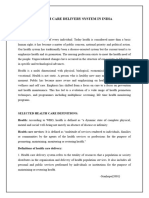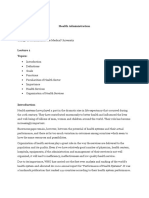0% found this document useful (0 votes)
24 views10 pagesOverview of US Healthcare System
The U.S. healthcare system is a complex organization that provides comprehensive care and is essential for improving health status, protecting against health threats, and ensuring equitable access to care. In 2023, healthcare spending accounted for 17% of the GDP, totaling $4.5 trillion, with high per capita costs but lagging health outcomes compared to other countries. Major stakeholders and managers play crucial roles in navigating the evolving challenges within this system.
Uploaded by
patricia.de.rosa1979Copyright
© © All Rights Reserved
We take content rights seriously. If you suspect this is your content, claim it here.
Available Formats
Download as PDF, TXT or read online on Scribd
0% found this document useful (0 votes)
24 views10 pagesOverview of US Healthcare System
The U.S. healthcare system is a complex organization that provides comprehensive care and is essential for improving health status, protecting against health threats, and ensuring equitable access to care. In 2023, healthcare spending accounted for 17% of the GDP, totaling $4.5 trillion, with high per capita costs but lagging health outcomes compared to other countries. Major stakeholders and managers play crucial roles in navigating the evolving challenges within this system.
Uploaded by
patricia.de.rosa1979Copyright
© © All Rights Reserved
We take content rights seriously. If you suspect this is your content, claim it here.
Available Formats
Download as PDF, TXT or read online on Scribd
/ 10
























































































